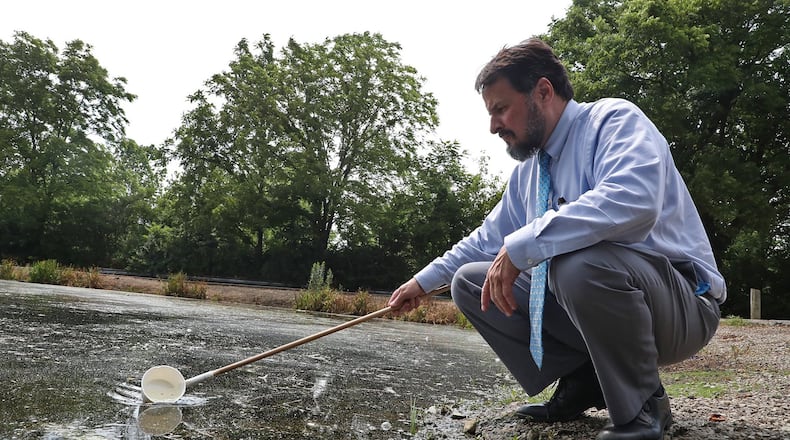“What we’re trying to do is make people aware of it, but also in reality they have to assume that the West Nile virus is present throughout the state. It’s not just one particular location,” said Shaffer, who noted this is early in the year to find West Nile in the area and that another was detected in Franklin County. “So when we find the disease in a particular area, of course we want to get a word out to those residents and let them know, but in general we also want everybody to know that they should all take precautions.”
RELATED: Full coronavirus coverage
Those precautions include applying mosquito repellent, wearing long sleeves and pants outside, staying indoors as much as possible and making sure screens on windows and doors are free of holes or rips.
While the district plans to spray the pesticide Duet when weather permits, it also encourages residents to treat or eliminate standing water on their property as that can turn into a breeding site.
“What people have to know is when we’re spraying, that is the least effective activity to actually go out and do,” Shaffer said. “When we go out and do we do this we’re only killing the mosquitoes that are flying at the time when we do it. In reality, the best mosquito control is getting rid of stagnant water where mosquitoes lay their eggs because we’ll go out knock down the flying insects, but the product has no residual value. The next day it’s gone, and in the meantime there’s literally thousands of eggs ready to hatch. Depending on the variety, mosquitoes will reproduce within seven to 14 days, so that’s why it’s very important to get rid of the stagnant water that may be around people’s homes.”
Unlike the strain of coronavirus first detected last year that causes COVID-19, the West Nile virus does not typically spread from human to human.
Report: Masked man gets away with money after robbing Springfield store
Mosquitoes become infected when they bite infected birds and subsequently spread the disease to humans when they bite them.
According to the CCCHD, approximately 80 percent of those who are infected will not show symptoms, but those who do will get them between three and 14 days of being bitten.
Up to 20% of people who become infected will have symptoms that can include fever, headache, body aches, nausea, vomiting and swollen lymph glands or a skin rash on the chest, stomach and back. Those symptoms can last as long as several weeks but might subside in a few days.
“Those people are miserable,” Shaffer said.
About one in 150 will develop severe illness including high fever, headache, neck stiffness, stupor, disorientation, coma, tremors, convulsions, muscle weakness, vision loss, numbness and paralysis. Those symptoms may last several weeks, and both death and permanents neurological effects are possible.
Residents who have a concern about the district spraying pesticide in their area may opt out by calling 937-390-5600 or emailing their request to environmental@ccchd.com.
While the novel coronavirus has stretched the CCCHD’s resources, Shaffer said funding from the Ohio EPA remains in place for the district to do its normal work toward tracking West Nile virus.
However, test processing has been slower than usual because it has to be done by the Centers for Disease Control rather than the Ohio Department of Health because ODH did not have money in the budget to hire summer workers.
The CDC has graciously offered to test about 250 samples a week, but that is only about 25% of the samples that are submitted to ODH,” Shaffer said.
“The testing is not full-bore as it was last year, but the testing is still going on,” Shaffer said.
About the Author

